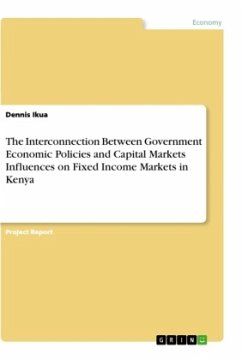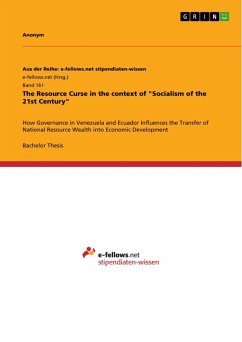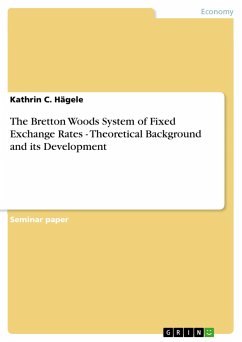Project Report from the year 2019 in the subject Business economics - Economic Policy, grade: 4.0, , language: English, abstract: The purpose of the study was to determine the effects of government economic policies and capital markets forces on fixed income markets in Kenya. The research was guided by three research questions were to determine the effects of fiscal policy on fixed income markets, to determine the effects of monetary policy on fixed income markets, and to determine the effects of capitals markets' forces on fixed income markets. The research was designed as an explanatory study with quantitative data that was collected from the official website of Central Bank of Kenya as well as from the website of Nairobi Securities Exchange. Data was collected for a period of five years beginning October 3, 2012 and ending on October 2, 2017. The data included the central bank rate, fiscal deficit, Kenya NSE Govt. Bond Index, and the computed spread between the market-weightedaverage rate (ask) and the weighted average of accepted bids (bid). Data analysis used multiple linear regression model, correlation analysis, and covariance analysis. Data analysis was conducted in Microsoft Excel using XLSTAT features. Findings of the study on the effects of fiscal policy on fixed income markets indicate that fiscal deficits, and therefore the fiscal policies, had a weak correlation with the performance of fixed income markets. A weak correlation indicated that there was a limited extent to which fiscal policies can be used in explaining movements in the fixed income markets. Monetary policy has a strong effect on the level of interest rates in the fixed income markets. The implications of this finding were that the monetary policy announcements, mainly announcements on central bank rate, can be used in predicting the direction of interest rates charged on treasury bills by the investors. However, the monetary policy announcements had a limited impact on the spread between the market-weighted average rate (ask) and the weighted average of accepted bids (bid) indicating the existence of a random walk in the determination of prices of Treasury bill instruments. On effects of capitals markets' forces on fixed income markets, FTSE NSE Kenya Govt. Bond Index has little to no impact on the interest rates charged on Treasury bill instruments in the primary market. The findings indicate that the performance of the FTSE NSE Kenya Govt. Bond Index would not be an accurate predictor of the level of interest rates for treasury instruments in Kenya.
Hinweis: Dieser Artikel kann nur an eine deutsche Lieferadresse ausgeliefert werden.
Hinweis: Dieser Artikel kann nur an eine deutsche Lieferadresse ausgeliefert werden.








